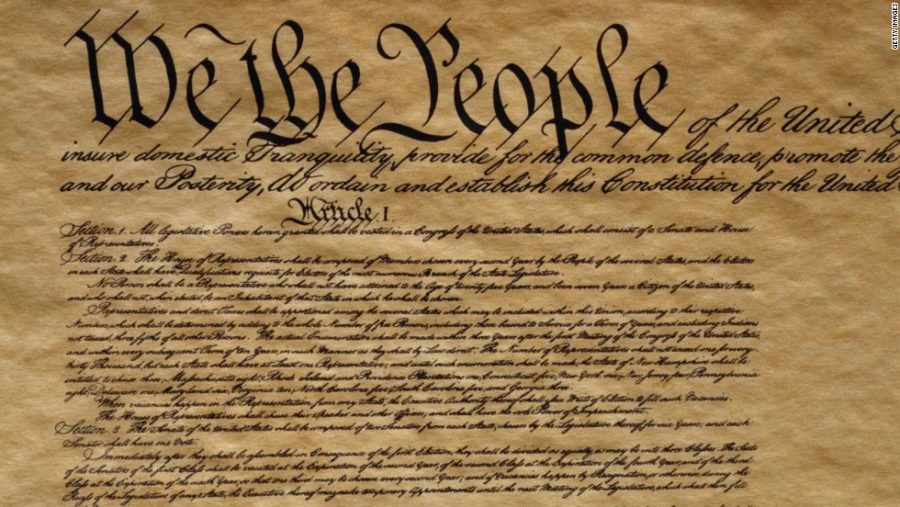A Brief History of U.S. Impeachment
Our current political climate can be confusing; two Woodside History teachers help clarify what's going on.
October 17, 2019
The U.S. Constitution serves as the guideline for most of our current political procedures.
With numerous accusations against President Donald Trump surfacing every week and impeachment proceedings already underway, many people are wondering what will happen in the next few months. Thankfully, resources like the internet (and two helpful Woodside U.S. History teachers) are full of information about impeachment’s history, allowing Americans to make predictions about what could happen next.
In regards to the impeachment process itself, U.S. History teacher Diane House gave thoughtful details.
“It’s all spelled out in the Constitution,” said House. “Essentially, the House [of Representatives] investigates and then passes what are called ‘Articles of Impeachment.’” While these Articles of Impeachment are written similarly to criminal indictments (accusations of criminal activity), they don’t have to be focused on criminality.
“‘High crimes and misdemeanors’ is the term,” said House, referencing the section of the Constitution describing what government officials can be accused of. As stated in the Constitution itself, “The President, Vice President and all civil Officers of the United States, shall be removed from Office on Impeachment for, and Conviction of, Treason, Bribery, or other high Crimes and Misdemeanors.” Basically, any member of the U.S. national government can be impeached for betraying their country, bribing people, or committing “high crimes and misdemeanors.”
House then elaborated: “[‘High crimes and misdemeanors’] is a very vague term, so it’s whatever the House thinks it means.” While the House of Representatives is traditionally expected to interpret “high crimes and misdemeanors” on their own, misuses of power are most commonly thought to be within the phrase’s definition.
After the majority of the House of Representatives votes to pass the Articles of Impeachment, the president is technically “impeached.” Then, a trial (similar to a criminal trial in which the Senators are the jurors) is started in the Senate to decide if the president will be removed from office – two-thirds of the Senate needs to vote in favor of the president’s removal in order for it to happen. The Chief Justice of the Supreme Court presides; today, this person would be John Roberts.
In 1868, the first impeachment followed these rules well. At the time, the Republican Party was intensely focused on helping former slaves achieve equal rights, and President Andrew Johnson’s lax approach to dealing with former slaveholders stirred up controversy. The fact that Johnson had only been made president by way of Abraham Lincoln’s assassination (Johnson was Lincoln’s Vice President) also added to the unrest.
“Andrew Johnson was what you would call a ‘moderate Southerner’… He wanted to let [Southerners] off the hook and let them start the KKK,” said Greg Gruszynski, a U.S. History teacher. “The radical Republicans… impeached him because they didn’t agree with what he was doing politically.”
Despite being impeached, Johnson was allowed by the Senate to stay in office. It would be 131 years until another president – Bill Clinton – would go through the same process.
“[Clinton’s impeachment] started with Whitewater [a scandal involving alleged illegal financing]… but then it evolved into an investigation about whether he had an affair,” said Gruszynski.
The affair in question was with Monica Lewinsky, an intern at the White House from 1995-1996; she spoke out about the affair nine times from 1995-1997, and, in 1998, an official investigation was opened into her relationship with Clinton. In denying the allegations, Clinton created lies that let his opponents accuse him of perjury in his Articles of Impeachment (however, the Senate voted to keep him in office).
“In the context of our current president, that just seems absurd – that somebody would be impeached for that compared to all of the lies that our current president tells,” said Gruszynski.
However, House believes that the Clinton impeachment is very similar to what is currently happening to Trump. Through comparison, she predicted the outcome of the current impeachment proceedings.
“The House will recommend Articles of Impeachment, and they will probably look exactly like the ones that they had for Clinton,” said House. “[There will] be probably an Abuse of Power, Obstruction of Justice… [and] Obstruction of Congress because [the Trump administration is] not turning evidence over.”
